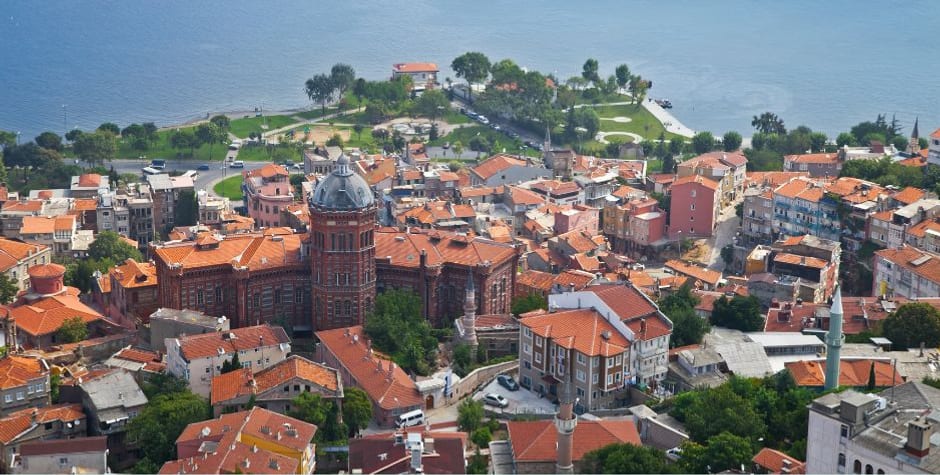

Turkey: The Systematic Plundering of Christian Properties
Turkey: The Systematic Plundering of Christian Properties
Turkey continues its systematic policy of plundering the properties of Christian minorities. The case of Balat Rum Balino Kilisesi Vakfı v. Turkey (application n° 3984/21), currently pending before the European Court of Human Rights (ECHR), is a glaring illustration of this practice.
The European Centre for Law and Justice (ECLJ) intervened as a third party in this case on January 30, 2025. The case concerns two Greek Orthodox foundations: those of the Balino Church in Balat and the Panayia Church in Belgratkapı, both located in the Fatih district, at the heart of Istanbul’s historic peninsula.
The district of Fatih starkly illustrates the marginal position that non-Muslims occupy today in Istanbul’s urban landscape. A striking contrast is evident: on one hand, a built and religious heritage that remains visible despite decades of exactions and destruction; on the other, an almost non-existent Christian demographic presence.
A Historically Endorsed Discrimination Against Christian Foundations
The two applicant foundations challenge the non-restitution of three of their properties, despite these properties being duly recorded in their 1936 declaration. A historical overview is necessary to understand the importance of this declaration. During the Ottoman era, community foundations lacked legal personality. They managed collective assets for the benefit of their religious communities, which were often registered in the land registry under the real name of a trusted community notable or even under the fictitious name of a religious saint.
Following the establishment of the Turkish Republic in 1923, the 1935 Foundations Law (No. 2762) recognized the legal personality of institutions that had been created for non-Muslim communities under the Ottoman Empire. This law required them, in order to obtain foundation status, to submit a declaration (known as the "1936 Declaration"), in which they had to specify, among other details, the nature and amount of their income and provide a list of their real estate properties. The applicant foundations complied with this requirement, listing in their declaration the properties they owned at the time, which are now at the center of this case.
In 1974, the Turkish Court of Cassation retroactively ruled that the 1936 Declarations should be considered as the founding statutes of community foundations. Moreover, these declarations contained an inventory of their properties. In the absence of an explicit clause in their declarations, these foundations were prohibited from acquiring additional real estate beyond what was listed in the document. The Court of Cassation appeared to consider that real estate acquisitions by such foundations could pose a threat to national security. As a result, thousands of properties were confiscated over the decades and transferred to the Public Treasury or the General Directorate of Foundations.
Turkey Must Return the Properties to the Greek Orthodox Foundations
Turkey refuses to recognize the applicant foundations' ownership of their properties listed in their 1936 Declaration, despite having committed to doing so under the Provisional Articles 7 and 11 of the 2008 Foundations Law (No. 5737).
Thus, the ECLJ urges the Court not only to acknowledge an obvious violation of the right to property of the applicant foundations (Article 1 of Protocol No. 1 to the European Convention on Human Rights) but also to recognize discrimination based on the Christian religion of these foundations (Article 14 of the Convention).
Moreover, the most appropriate way for the Turkish government to remedy the harm caused would be to return the three disputed properties to the two foundations. Indeed, the Turkish judicial system is characterized by extreme delays and manifest institutional bad faith when handling cases involving Christian minorities. A retrial could result in another rejection or an unjustified prolongation of the legal proceedings, further depriving the applicants of their properties, with severe legal and practical consequences.
When the Turkish administration refuses to recognize a foundation's ownership of a property declared in 1936, especially if the property was acquired between 1936 and the 1974 ruling of the Turkish Court of Cassation, these assets can be formally transferred to the state or other public institutions.
Even worse, these properties can de facto be seized by various mafia-linked enterprises, particularly in the parking and real estate sectors, seeking easy profits. As the buildings deteriorate, under the pretext of security concerns, the prefecture and district municipalities eventually take de facto possession of these properties, to the point of creating the impression that their decline is being deliberately accelerated (wooden structures removed, fires…) in order to reclaim the land.
Turkish Christians Facing Turco-Islamic Nationalism
Such a measure of restitution would ensure respect for the property rights of the applicant foundations while also preserving their cultural and spiritual heritage, as well as their financial and administrative autonomy. It would also send a strong message against the ongoing spoliation of properties belonging to Christian minorities in Turkey. The Turkish Constitution officially recognizes Turkey as a secular state, and non-Muslim minorities are supposed to be protected under the 1923 Treaty of Lausanne. However, in practice, Christians are treated as second-class citizens by the administration, subjected to various forms of discrimination.
As a direct consequence of this discrimination, large-scale emigration has significantly reduced the Christian presence in Turkey. In 1920, there were still two million Christians in Turkey; today, they number only 169,000, representing 0.2% of the population. More specifically, while Greek Orthodox Christians accounted for 100,000 citizens in 1923, they are now fewer than 2,000, despite being responsible for nearly 4,000 properties belonging to their foundations. This extremely low and aging demographic thus threatens the very survival of Greek Orthodoxy in Anatolia.
This case is just one example among many of the latent persecution suffered by Christians in Turkey, who are victims of an ethno-religious nationalism seeking to homogenize the country into an exclusively Turkish and Muslim nation. The ECLJ has denounced this persecution in its October 2024 submission for Turkey’s Universal Periodic Review at the United Nations Human Rights Council. The very survival of Turkey’s last Christian communities is at stake. By denying them access to their properties, Ankara is actively pursuing its objective of the gradual disappearance of Christians from the country. A strong ruling from the European Court of Human Rights (ECHR) could finally put an end to this policy of erasure.











